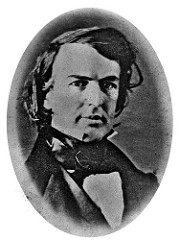Monday, October 7. —Capt. Tompkins very suddenly marched off to Harper’s Ferry, with the right section. Thunder storm in the evening.
American Civil War Chronicles
Capt. Tompkins very suddenly marched off to Harper’s Ferry—Rhode Island Light Artillery, by Theodore Reichardt
October 7, 2021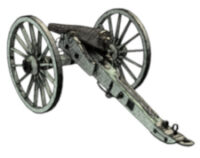
“Tomorrow there is to be a grand Review of 4000 Cavalry by Genl McClellan.”—Horatio Nelson Taft
October 7, 2021
MONDAY, OCTOBER 7, 1861.
Went for Doct Piper this morning for Willie. He has I think only a bad cold on his lungs and will soon be well. I was on the Ave this morning, saw it filled with Cavalry for one mile. I was at the Pat office in Col James room. He is anxious to have me in his room, as 1st Assistant. Fixed up my Aquarium this afternoon in our dining room. It began to rain about dark with constant thunder and lightening. Tomorrow there is to be a grand Review of 4000 Cavalry by Genl McClellan.
______
The three diary manuscript volumes, Washington during the Civil War: The Diary of Horatio Nelson Taft, 1861-1865, are available online at The Library of Congress.
Lincoln to Curtis: “I am greatly perplexed about Gen: Fremont…”
October 7, 2021
Washington, D.C.
Oct. 7. 1861
Brig: Genl. S. R. Curtis
My dear Sir.
Without prejudice, and looking to nothing but justice, and the public interest, I am greatly perplexed about Gen: Fremont: In your position, you can not but have a correct judgment in the case; and I beseech you to answer Gen. Cameron, when he hands you this, “Ought Gen: Fremont to be relieved from, or retained in his present command?” It shall be entirely confidential; but you can perceive how indispensable it is to justice & the public service, that I should have, an intelligent unprejudiced, and judicious opinion from some professional Military man on the spot, to assist me in the case. Yours very truly
A. LINCOLN
“I will do all I can to prevent a laudable zeal from doing injury to either kind of service…”—The Letters of Samuel Ryan Curtis
October 7, 2021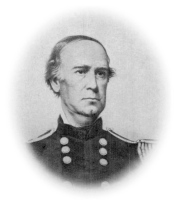
Head Quarters Camp of Instruction
Benton Barracks (near St. Louis) Oct 7. 1861
Governor H R Gamble1
Dear Sir
Yours of the 5th inst. on the subject of conflicting enrollment by States and United States Officers, is just received. When I have been informed of men brought in this camp who had been previously enrolled by your proper officers, I have sent them out with a reproach for leaving your enrollments.
But it is proper to say the men and officers have generally acted in good faith; supposing that by joining the United States service, they would relieve the State from the expense of their organization and euipment, and with equal certainty accomplish the object of their enrollment.
I see very many dangers of conflicting exertions and efforts among officers who desire to fill up their command, but I will do all I can to prevent a laudable zeal from doing injury to either kind of service.
Very respectfully yours
Saml R Curtis
Brig Gen’l Commandg
[copy]
1. Hamilton R. Gamble was selected provisional governor of Missouri, June 18, 1861, to succeed Claiborne F. Jackson, who had thrown his lot with the Confederacy. Gamble, who disagreed with Fremont and later with Curtis over the status of negroes, was a brother-in-law of Edward Bates, atty. gen. in Lincoln’s cabinet.
At noon we left Jefferson City, going due west.—Fremont’s Hundred Days in Missouri.
October 7, 2021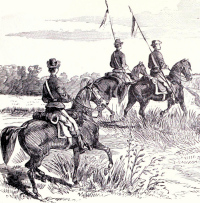
Camp Lovejoy, October 7th. For the last two days the troops have been leaving Jefferson City, and the densely peopled hills are bare. This morning, at seven o’clock, we began to break camp. There was no little trouble and confusion in lowering the tents and packing the wagons. It took us a long time to-day, but we shall soon get accustomed to it, and become able to move more quickly. At noon we left Jefferson City, going due west.
Our little column consists of three companies of the body-guard, numbering about two hundred and fifty men, a battalion of sharp-shooters (infantry) under Major Holman, one hundred and eighty strong, and the staff. The march is in the following order. The first company of the guard act as advance-guard; then comes the General, followed by his staff riding by twos, according to rank; the other two companies of the guard come next. The sharp-shooters accompany and protect the train. Our route lay through a broken and heavily wooded region. The roads were very bad, but the day was bright, and the march was a succession of beautiful pictures, of which the long and brilliant line of horsemen winding through the forest was the chief ornament.
We reached camp at three o’clock. It is a lovely spot, upon a hill-side, with a clear, swift-running brook washing the foot of the hill. Presently the horses are tied along the fences, riders are lounging under the trees, the kitchen-fires are lighted, guardsmen are scattered along the banks of the stream bathing, the wagons roll heavily over the prairie and are drawn up along the edge of the wood, tents are raised, tent-furniture is hastily arranged, and the camp looks as if it had been there a month. Before dark a regiment of infantry and two batteries of artillery come up. The men sleep in the open air without tents, and innumerable fires cover the hill-sides.
We are upon land which is owned by an influential and wealthy citizen, who is an open Secessionist in opinion, though he has had the prudence not to take up arms. By way of a slight punishment, the General has annoyed the old man by naming his farm “Camp Owen Lovejoy,” a name which the Union neighbors will not fail to make perpetual.
Fremont’s Hundred Days in Missouri was published in three installments in The Atlantic Monthly. The anonymous author appears to have been a member of Fremont’s staff with a disdainful bias towards Missourians, even those who were pro-Union.
Return of the Wounded
October 7, 2021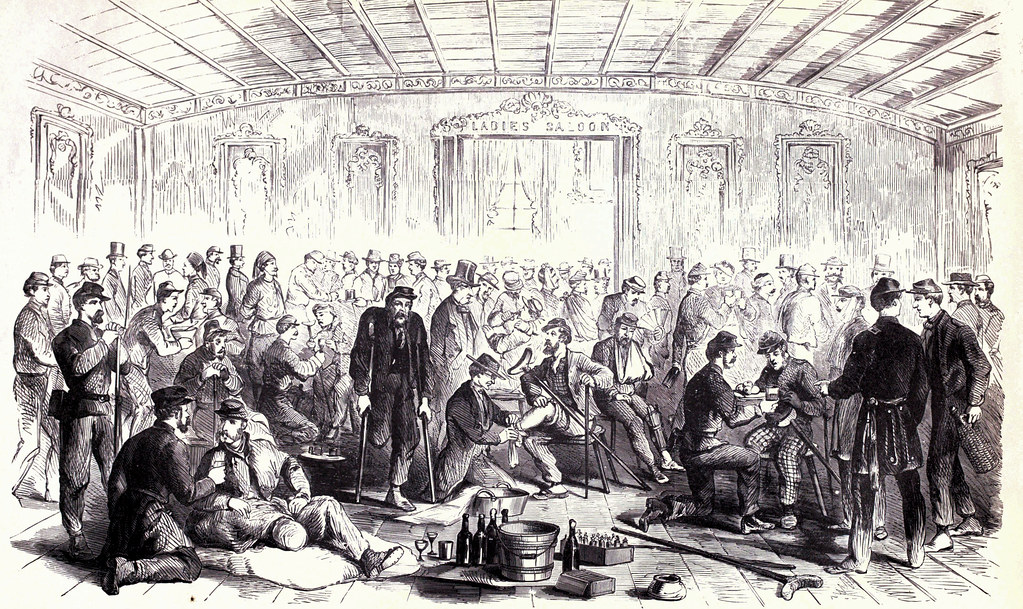
Return of Wounded Soldiers of the Federal Army Captured at Bull Run–Scene in Hampton Roads on Board the United States Steamer ‘Louisiana’ to which they were Transferred, under a Flag of Truce, October 7th, 1861
(from Frank Leslie’s Illustrated History of the Civil War…, edited by Louis Shepheard Moat, Published by Mrs. Frank Leslie, New York, 1895)
“The United States steamer Express met by agreement the Confederate steamer Northumberland with a flag of truce, about twelve miles above Newport News, and brought down fifty-seven wounded prisoners who had been captured at Bull Run and taken to Richmond. Their release was not due to the magnanimity of the Confederate authorities, but rather to their inability to supply their wants.”
Mustered into the service of the United States.—David L Day.
October 7, 2021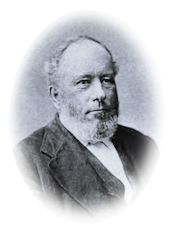 Oct. 7. We were today mustered into the service of the United States, by Captain John M. Goodhue, U. S. A. The company is designated as Company B, and the regiment as the 25th Massachusetts volunteers. I suppose we are now stuck for three years—unless sooner shot.
Oct. 7. We were today mustered into the service of the United States, by Captain John M. Goodhue, U. S. A. The company is designated as Company B, and the regiment as the 25th Massachusetts volunteers. I suppose we are now stuck for three years—unless sooner shot.
No more fighting in this region unless the enemy attack, which they will not do.—Letters of Rutherford B. Hayes.
October 7, 2021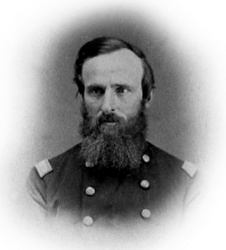
Camp Lookout, Monday, October 7, 1861.
Dearest:—The mails are in order again. Letters will now come promptly. On the day after I wrote you last we got all the back letters – lots of papers and dates up to October 1. One queer thing, a letter from Platt of July 31 and one from Mother of October 1 got up the same day.
Our campaign is closed. No more fighting in this region unless the enemy attack, which they will not do. We are to entrench at Mountain Cove, eight miles from here, at Gauley Bridge, twenty miles off, and [at] Summersville, about the same. These points will secure our conquest of western Virginia from any common force, and will let half or two-thirds of our army go elsewhere. I hope we shall be the lucky ones to leave here.
The enemy and ourselves left the mountains about the same time; the enemy first, and for the same reason, viz., impossibility of getting supplies. We are now fourteen miles from Mount Sewell and perhaps thirty miles from the enemy. Our withdrawal was our first experience in backward movement. We all approved it. The march was a severe one. Our business today is sending off the sick, and Dr. Joe is up to his eyes in hard work. We have sixty to send to Ohio. This is the severest thing of the campaign. Poor fellows! We do as well as we can with them; but road-wagons in rain and mud are poor places.
Very glad – oh, so glad – you and Ruddy are well again. You did not tell me you were so unwell. I felt so badly to hear it. Do be very careful.
Don’t worry about the war. We are doing our part, and if all does not go well, it is not our fault. I still think we are sure to get through with it safely. The South may not be conquered, but we shall secure to the Nation the best part of it.
We hope to go to Kentucky. If so, we shall meet before a month. Our regiment is a capital one. But we ought to recruit. We shall be about one hundred to one hundred and fifty short when this campaign is ended.
Tomorrow is election day [in Ohio]. We all talked about it today. We are for Tod and victory.
Good-bye. Much love to all.
Affectionately, yours ever,
R.
Trip to Davenport and back.–Alexander G. Downing.
October 7, 2021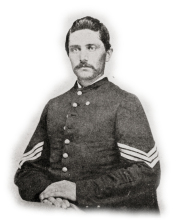
Monday, 7th–I left for Davenport early this morning, riding to town with a farmer, and got back to camp at 2 o’clock. Quite a number of the boys around Allen’s Grove are in camp here as members of the Second Iowa Cavalry.
Intolerable heat, thunderstorm, thunderclaps and blinding lightning.— William Howard Russell’s Diary.
October 7, 2021
October 7th.—The heat to-day was literally intolerable, and wound up at last in a tremendous thunderstorm with violent gusts of rain. At the Legation, where Lord Lyons entertained the English visitors at dinner, the rooms were shaken by thunder claps, and the blinding lightning seemed at times to turn the well illuminated rooms into caves of darkness.
“Why do the Southern agents have it all their own way?”–Adams Family Letters, Charles Francis Adams, Jr., to his brother, Henry.
October 7, 2021
Quincy, Sunday, October 6, 1861
I received your letter of the 7th some ten days ago and not a word from London since; so that as I have seen no signs of trouble in the press, I presume the little flurry you there mention has passed away. In fact I cannot say I share your apprehensions, though I must confess I think the government’s cards, so far as the public sees them, are played badly enough both here and in England. While the agents of the Confederates are abroad working the whole time at public opinion and at the foreign mind, influencing papers and thinkers and undermining us the whole time, our press at home does but furnish them the materials they need and our agents abroad apparently confine their efforts to cabinets and officials and leave public opinion and the press to take care of themselves. This may not be so in fact, but if it is not, all that can be said is that the Southern emissaries are far more efficient than ours. We have money and the command of the sea, so that Europe can know nothing except through us, and yet, from the beginning, so much more active and efficient has the South been, that we have done nothing but lose ground. Why is this? I may be all wrong, but to me our policy in England seems as plain as noon-day, but I see no signs of its operation on the press, though I hope it is working secretly. England is made up of large interests. Some of those are in our favor and some opposed to us; but why are they not played off against each other? This war promises immense results to India, and has already carried up the Indian bonds. That interest is immensely powerful in England and can only reap benefit from the war; but I have not noticed that its organs were particularly friendly to us. The shipping interest derives great benefit from the war, but their organs are opposed to us. Why is this? What are our agents doing? Why is not India played off against Manchester and London against Liverpool? Why do the Southern agents have it all their own way? Why are not a few American papers sufficiently under the control of government to enable some expression of good sense to go abroad? Why is everything so utterly left to take care of itself? Remember I only ask these as questions, for I do not know but what a profound plan and ceaseless activity under-runs it all; but if it does, the State department certainly keeps its own councils much better than the war. So much for these things.
I wait curiously for the next development from abroad and chuckled amazingly over the tight place in which the Governor had got Lord John. Meanwhile, if there is to be trouble, for Heaven’s sake give me a few days’ notice. . . .
Tuesday, 7th
I send the corrected copy of Sumner’s speech herewith. Did you ever see anything like the classical exposure in the Advertiser? How can it be accounted for? What can Sumner mean by perpetrating historical frauds so sure of detection? The speech has been made the subject of most severe criticism and that too from men hitherto Sumner’s friends. Dana tore it to shreds for my edification in a most substantial manner, and Sumner has done himself no credit. For myself I’m glad the speech was made, though I think very differently from most in these matters. The education is going on and the fallacies lie hid. I agree with it, however, neither in theory or results, and if we had a Juvenal, would not the celebrated author of a certain 4th of July peace oration, now become the leading advocate for a savage Servile war, catch particular jess. Sumner is a humbug! There’s no doubt about it. He’s been a useful man in his day, but he’s as much out of place now as knights in armor would be at the head of our regiments.
The convention was managed and its results brought about by Dana, and it was to him a great personal triumph as he had all the old party associations to contend with. You never saw a man chuckle over anything as he did over his doings at Worcester. Sumner, I imagine, is offended with him and will evince it in the usual way. There is, of course, no political contest. The position of the country is now very curious and my strong conviction is that everything is ready and one good victory would start everything. Politics are so dead that a little success would lead to an era of good feeling in the North. Business is, in New England, all ready to rise under the tariff to a state of activity, unusual even in time of peace. Everything that is left is strong and the present feeling of depression is wholly unfounded. I am convinced that one victory would make an almost incredible change, but we shall not see it for a long time without a victory.
A Diary of American Events.
October 7, 2021 October 7.–Colonel Matthews, encamped with four hundred Home Guards about Twenty miles from Hermann, Missouri, was compelled to abandon his camp; he having received intelligence that a large body of rebels were marching to attack him.–N. Y. Tribune, October 9.
October 7.–Colonel Matthews, encamped with four hundred Home Guards about Twenty miles from Hermann, Missouri, was compelled to abandon his camp; he having received intelligence that a large body of rebels were marching to attack him.–N. Y. Tribune, October 9.
–Capt. Michael Berry, late of the steamship Marion, was arrested in New York by detective Raynor, of Brooklyn, and sent to Fort Lafayette on charge of treason. The exact nature of the charge preferred against Capt. Berry has not transpired, but it is supposed that he was acting as a confidential agent for Jeff. Davis. His sympathy for the Southern Confederacy, and the Palmetto flag especially, is notorious, and the only wonder is, that he was not conducted to prison long ago. His sailing under the rebel flag, and his open avowal of. sympathy for the enemies of the Union at Charleston and elsewhere, rendered him a dangerous man; but he is now placed in a position where he cannot act against the Union cause, even if he felt ever so much disposed to do so. His movements of late have been characterized with much secresy, and there is no knowing how much aid and comfort he has extended to the enemy, but henceforward it is presumed Capt. Berry will occasion little trouble or uneasiness.–N. Y. Herald, October 8.
–Fifty-seven released prisoners, taken at the battle of Bull Run, were returned to Fortress Monroe, from Richmond. They were released because their wants could not be supplied by the rebel Government.
–General Fremont, accompanied by General McKinstry, left Jefferson City for Sedalia, Mo., with the determination of following Gen. Price.–At Saratoga, N. Y., a large Union meeting was held, at which eloquent and stirring speeches were made by Lyman Tremaine, Benjamin Nott, and the Rev. A. D. Mayo, the Unitarian preacher.
–The gunboats Tyler and Lexington had an active engagement to-day, with the rebel shore batteries at Iron Banks, three miles above Columbus, Ky. The boats left Cairo, Ill., at nine o’clock, for down-river reconnoissance, and arriving at Lucas Bend, got sight of the rebel gunboat Jeff. Davis, which, on chase being given, put about with all possible despatch for Columbus. The Lexington and Conestoga, while in chase, and throwing shot, were suddenly fired upon by masked batteries on each side of the river. The shots, however, generally fell short. A battery of rifled cannon on the Iron Bunks, threw balls over and around the gunboats, cutting close, but fortunately doing no damage. Parties on board represent the scene for a time as particularly exciting. Shot and shell were flying in uncomfortable proximity, making the air ring with music. The guns of the boats were admirably manned, every shot going home, and the shells bursting in the air over the rebel quarters, causing a great .commotion among them. The boats finally drew off and returned to Cairo.–Cincinnati Commercial.
Civil War Day-By-Day
October 7, 2021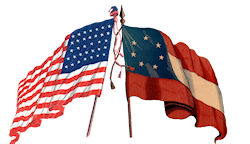 October 7, 1861
October 7, 1861
- Confederate government signs a treaty with the Cherokee Indians.
A Chronological History of the Civil War in America1
- Gen. W. F. Sherman, relieved.
- Gen. Robert Anderson relieved of his command in Kentucky, his health not permitting him to enter on active service.
- Gen. Fremont and his army leave Jefferson City, Mo., in pursuit of the rebels under Gen. Price.
- A Chronological History of the Civil War in America by Richard Swainson Fisher, New York, Johnson and Ward, 1863
Some days we fared well; on other days there would be no dinner, but a detestable bacon soup, hardly fit for hogs.
October 6, 2021 Sunday, October 6. —Camp at Darnestown. The battery received three new guns in the afternoon. Lieut. J. G. Hassard, having joined our battery, at Darnestown, commanded the right section as First Lieutenant. Company cooking was introduced by him. Before that, every detachment done its own cooking. The enterprise itself, of cooking for the whole company, and the selling of a part of the rations, for raising a company fund would have been well enough, but the management was extremely poor. Some days we fared well; on other days there would be no dinner, but a detestable bacon soup, hardly fit for hogs. We were told that the government rations would not admit of a dinner every day. But what good did it do then to sell rations, under the pretext of raising a company fund? This is a question which never could nor never will be satisfactorily explained by those who started it.
Sunday, October 6. —Camp at Darnestown. The battery received three new guns in the afternoon. Lieut. J. G. Hassard, having joined our battery, at Darnestown, commanded the right section as First Lieutenant. Company cooking was introduced by him. Before that, every detachment done its own cooking. The enterprise itself, of cooking for the whole company, and the selling of a part of the rations, for raising a company fund would have been well enough, but the management was extremely poor. Some days we fared well; on other days there would be no dinner, but a detestable bacon soup, hardly fit for hogs. We were told that the government rations would not admit of a dinner every day. But what good did it do then to sell rations, under the pretext of raising a company fund? This is a question which never could nor never will be satisfactorily explained by those who started it.
“Our Willie has been ill for some days, threatened with inflamation of the lungs.”—Horatio Nelson Taft
October 6, 2021S UNDAY 6
UNDAY 6
Still very hot with some wind and much dust. Been to Church all day. Young Mr Hopkins from Wmstown Mass preached this afternoon. He is a son of Doct Hopkins, President of Wms College. He is a very promising young man. I spoke to him after meeting, being introduced by Doct Smith. Our Willie has been ill for some days, threatened with inflamation of the lungs. Very hot and feverish nights, better during the day.
______
The three diary manuscript volumes, Washington during the Civil War: The Diary of Horatio Nelson Taft, 1861-1865, are available online at The Library of Congress.
“…out to the camp of the Rhode Island 2nd.”—Woolsey family letters; Eliza Woolsey Howland to husband Joseph Howland.
October 6, 2021Oct. 6.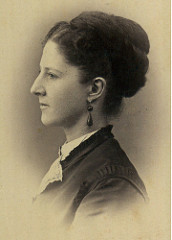
After dinner yesterday we drove out to the camp of the Rhode Island 2nd, to see the friend of our infancy and of hay-loft and cow-stall memory–Col. Frank Wheaton, son of Dr. Wheaton of Pomfret, Connecticut, to whose farm-house Mother took us all to board, the summer after Father’s death. It is about twenty years (!) since we all played together. You know it was for him that Mary got that ugly scar across her nose, in her anxiety to reach him through a glass window, and they two at the age of about seven were married in state and went to housekeeping in the cow-stall on apples and flagroot. He says he remembers it all most distinctly and still claims Mary as “his wife by right” though he has had one, and is engaged to a second.
He was very much pleased to find that he had met you too, for he was mustering-in officer at Albany when you were there, and swore in, part of the 16th. He and the others were “delighted with Adjutant Howland, who used to come to their office nearly every day and always had his muster rolls right.”
I was sorry to hear that the mare “Lady Jane” was so sick and I send George Carr out to camp to see if he can do anything for her. As he has known her from early youth he may understand her insides better than others do. You may be surprised at my being able to get a pass for George, but not more than I was! A mere statement of the case dissolved all the adamantine walls round the Provost Marshal, and is only another proof of our being “noble-hearted women of luck.”
How funny it is that you should have met the Wheatons again. It is one of the queer ways in which people turn up. I wonder if they remember the little school which Mother held for us every day in the porch of their father’s house in Pomfret, and the yellow hymn book, and the tunes of
![]()
Our Father in Heaven
We hallow Thy name,”
![]()
and
![]()
“God is in Heaven, would He hear
If I should tell a lie?”
![]()
–and then how at times we used to see who could eat the most ears of corn! And the skeleton in his father’s office, what a corner of horrors that was!
Clerk for Uncle Oliver Eldridge who is to command the steamer Atlantic on General Sherman’s secret expedition to some southern port.—War diary and letters of Stephen Minot Weld.
October 6, 2021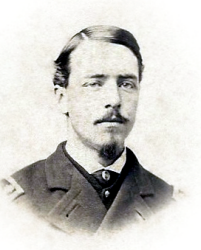 Sunday, October 6, 1861.—While I was spending Sunday at home, I learned that Uncle Oliver Eldridge[1] was going to sail in command of the steamer Atlantic on General Sherman’s secret expedition to some southern port. I immediately asked Father to let me go with him as captain’s clerk, or in some other capacity. He was unwilling, but finally consented to ask Uncle Oliver if he could take me. Father said that there was no room for me, and I therefore gave up all idea of going, to my great disappointment.
Sunday, October 6, 1861.—While I was spending Sunday at home, I learned that Uncle Oliver Eldridge[1] was going to sail in command of the steamer Atlantic on General Sherman’s secret expedition to some southern port. I immediately asked Father to let me go with him as captain’s clerk, or in some other capacity. He was unwilling, but finally consented to ask Uncle Oliver if he could take me. Father said that there was no room for me, and I therefore gave up all idea of going, to my great disappointment.
In the afternoon Horace Howland[2] came out to our house and wanted me to go in town and dine with him. We dined at Parker’s and then went to the Lothrops’ to take tea. We left there in time to take the nine o’clock bus for Cambridge. When we reached Cambridge, I found a letter for me from Father, saying that I might go with Uncle Oliver, and that I must start at eight o’clock the next morning. I packed my trunk in a few minutes, and went into Boston and spent the night at Parker’s. I took the 8.30 train for New York in the morning, and reached New York at 5. I went directly to the Astor House, and found that Uncle O. had not started, much to my relief, as I was afraid he might have gone. I saw him in the evening, and he introduced me to Captain Hascall, U. S. Q. M., who said he would give me a place as one of his clerks. I went down to Collins’s wharf the next morning, and was there introduced to Saxton and Marsh, both Captain Hascall’s clerks.
(I spent a week here, at times quite busy, loading ship, etc. I called on the Rowlands and also went to Horace’s apartments, which he has with Ned Wetmore[3] and Fowler. I enjoyed myself very much, being reminded of old college times. While in New York I saw Wilson’s regiment[4] pass through, and felt proud of Massachusetts when I heard the cheers and praises so bountifully bestowed upon them. I saw Tom Sherwin[5] and Charley Griswold[6] with the regiment. )
[1] Married to my step-mother’s sister, Miss Almira Hallett; he was a sea-captain, and a fine man.
[2] My classmate.
[3] Edmund Wetmore, my classmate.
[4] The 22d Mass., Col. Henry Wilson, United States Senator.
[5] My classmate and college chum.
[6] Afterwards Colonel of the 56th Mass.
Downing’s Civil War Diary.–Alexander G. Downing.
October 6, 2021 Sunday, 6th–I remained all day at Mr. Moore’s. Mr. Moore is a Mexican War veteran.[i]
Sunday, 6th–I remained all day at Mr. Moore’s. Mr. Moore is a Mexican War veteran.[i]
[i] Mr. Moore was an uncle of my friend and schoolmate, John Moore. –A. G. D.
I am advised not to leave Washington—William Howard Russell’s Diary
October 6, 2021 October 6th.—A day of wandering around, and visiting, and listening to rumours all unfounded. I have applied for permission to accompany the Burnside expedition, but I am advised not to leave Washington, as McClellan will certainly advance as soon as the diversion has been made down South.
October 6th.—A day of wandering around, and visiting, and listening to rumours all unfounded. I have applied for permission to accompany the Burnside expedition, but I am advised not to leave Washington, as McClellan will certainly advance as soon as the diversion has been made down South.
“Judging from the newspapers, one would think we were on the eve of a battle every day, but here there seems little apprehension of it.”–Letters from Elisha Franklin Paxton.
October 6, 2021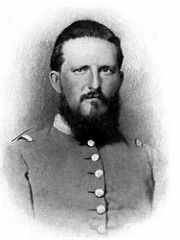 Camp near Fairfax C. H., October 6, 1861.
Camp near Fairfax C. H., October 6, 1861.
Your letter of October 1st was received on yesterday, and I am very much gratified at the cheerful feeling which it manifests. It shows, too, that you are giving a very commendable attention to the business under your charge, and give promise, if the war lasts, of your being a first rate business woman. You have your mind set in the right direction, for it seems as if the war would be interminable, and the sooner you learn how to take care of yourself the better it will be. Times are very dull with us here. Our troops are but a mile or so distant from the enemy,–so near that our pickets, it is said, occasionally meet and converse with theirs, swap newspapers, tobacco, whisky, etc. Judging from the newspapers, one would think we were on the eve of a battle every day, but here there seems little apprehension of it. We may have a battle, but then again we may not. On the whole, the soldiers would just as lief fight as not. We are going to have a sermon this evening, and I will bid you good-bye to listen to it. Kiss our dear little boys for me, and remind them of me. I should regard their forgetting me as the saddest loss sustained by my absence from home. Think of me often, Love. My fondest hope, the dearest wish of my heart, is to be with you again. Remember me to the servants, and to Fitz and his wife, to Annie, Rachel and my friends.
A Diary of American Events.
October 6, 2021 October 6.–The schooner Alert was captured off Charleston, S.C., by the United States steamer Flag. When first discovered, the schooner had the Palmetto flag flying, but upon being chased, and satisfied of her fate, she hoisted the English flag, union down, as a signal of distress. Upon the vessel were found concealed a Confederate and a Palmetto flag, and the cook stated that just before the capture the captain burned up the ship’s papers. These found aboard, purporting to be English, were new, and evidently got up for the occasion.– N. Y. Tribune, October 18.
October 6.–The schooner Alert was captured off Charleston, S.C., by the United States steamer Flag. When first discovered, the schooner had the Palmetto flag flying, but upon being chased, and satisfied of her fate, she hoisted the English flag, union down, as a signal of distress. Upon the vessel were found concealed a Confederate and a Palmetto flag, and the cook stated that just before the capture the captain burned up the ship’s papers. These found aboard, purporting to be English, were new, and evidently got up for the occasion.– N. Y. Tribune, October 18.
–The Tenth regiment of Maine Volunteers, under the command of Colonel George L. Beal, left Portland for the seat of war.
–Rochester, N. Y., has sent eighteen companies to the Union army. Another has been recruited in the country, making nineteen in all from Monroe Co.–Col. Rankin, M. P., who was engaged in recruiting a regiment of Lancers at Detroit for the Federal Government, was arrested at Toronto, Canada, for violation of the enlistment act.–N. Y. Commercial, October 9.
Civil War Day-By-Day
October 6, 2021 October 6, 1861
October 6, 1861
- Winfield Scott informs General Robert Anderson that he is relieved of duty by telegram. He relinquishes command of the Department of Kentucky the following day.
A Chronological History of the Civil War in America1
- Skirmish at Flemington, Ky.; Home Guards defeated the rebels.
- A Chronological History of the Civil War in America by Richard Swainson Fisher, New York, Johnson and Ward, 1863
Sworn in!–Alexander G. Downing.
October 5, 2021
Saturday, 5th–Our company was sworn into the United States service today, by Captain Alexander Chambers of the regular army. Four men were rejected, which left ninety in the company. Fisher was rejected because he was too short–less than five feet,[i] and Lowe was rejected because he was pigeon-toed.[ii] I got a pass and went to Allen’s Grove to see John Moore.
[i] He was taken later, however, when the need of men was greater and also because of his persistence.–A. G. D
[ii] Lowe feigned to be pigeon-toed, so that he would be rejected, having got chicken-hearted. The boys jeered him.–A. G. D.
